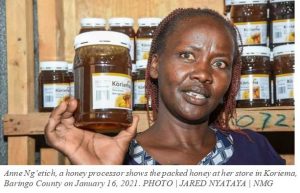
A training Anne Ng’etich attended in 2016 opened her eyes to massive opportunities in the honey value chain.
Before then, she was just selling her honey along the road at Koriema, Baringo County, using water bottles. This meant her customers were just limited to those plying the Kabarnet-Marigat highway.
The training on value addition was courtesy of the Agricultural Sector Development Support Programme (ASDSP).
To start off her value addition business, she obtained Sh20,000 from her banking table group. She knew she was taking a great risk as she didn’t know how the business would pan out. However, she was ready to test her entrepreneurial mettle.
“If you want profit, you should be ready to take risks,” says Ms Ng’etich. “Although I had minimal skills in business management, I grasped opportunity in beekeeping and commercial honey production after realising that traditional honey producers faced market challenges.”
Her risk has, however, paid off as the business has grown and now she has customers all over the country. The training, she notes, was a game-changer.
“Since undergoing training on new packaging techniques by ASDSP in 2016 I have moved away from packaging in recycled beverage bottles,” she notes.
The entrepreneur is currently buying honey from scores of farmers in Baringo County. She then packages it as Koriema Honey Packers.
“The clientele has expanded and now I have supermarkets and retailer shops across the country and I even have some orders for the export market,” says Ms Ng’etich, adding that she has markets Nairobi, Nakuru and Kisumu.
“My honey is sourced from the beekeeping farmers living in and around the greater Baringo County mainly Tiaty.”
Every Monday, Ms Ng’etich buys honey from farmers worth Sh100,000. Even though she depends on farmers for raw materials, she also has her own 10 beehives.
“Initially, I used to buy honey worth Sh20,000 but this has gradually grown as I keep ploughing back my profits,” she says.
She sells her honey for Sh700 a kilo with five litres going for Sh4,500. Despite working on orders, she still does roadside sales. She says she decided to venture into the honey business to avoid just sitting at home.
“Honey venture would allow me to stay at home but make some money,” Ms Ng’etich says.
Apart from her daughter who helps her run the business, she has employed one other person. Ms Ngetich says honey from Baringo is of top quality because of a favourable tropical climate.
The bee species found in this region is Apis Mellifera Yemenitica commonly referred to as honeybee. Its advantages is that it withstands and survives drought conditions and has high honey yield.
Ms Ng’etich says the main challenge she faces is the scarcity of honey is some seasons affecting the pricing.
onyangooluoch85@gmail.com
bbii@ke.nationmedia.com




